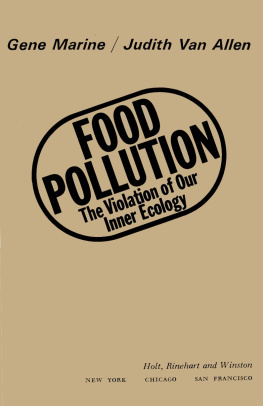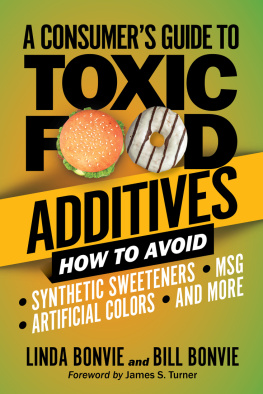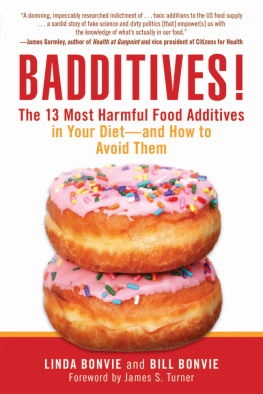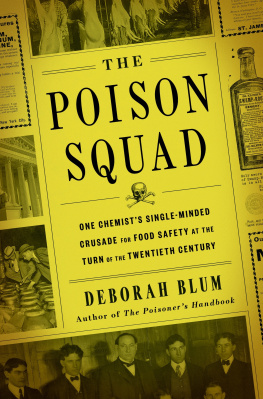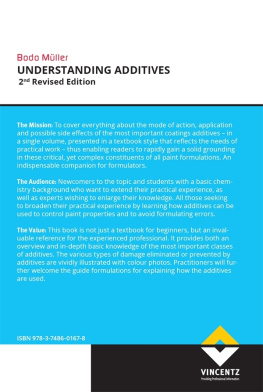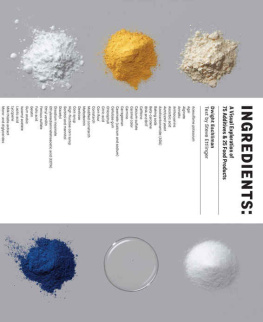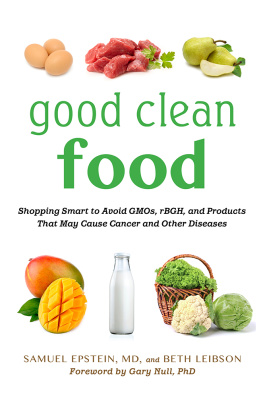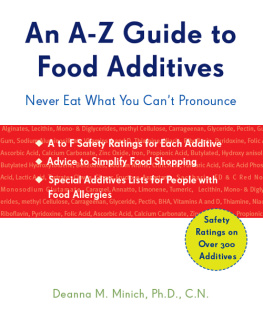Food Pollution
_______________________
GENE MARINE
JUDITH VAN ALLEN
1971
for
Dr. Jacqueline Verrett
and her colleagues
who are also trying to tell the truth
_______________________
Preface
We are not food freaks. On the contrary.
The pronoun we, of course, reflects the dual authorship of the book; but the reader may experience some confusion, or at least a disturbing jar, at the occasional use of I. When that happens, I am Gene Marine, and it happens because in the final version I occasionally draw from my own experience for an example, or have an observation that may not be shared. Those few sentences are the only ones for which we do not both share full responsibility.
As an example, it doesnt mean quite the same thing for both of us to say that we are not food freaks. / probably violate in my own life every tenet of this book, in addition to which I smoke cigarettes, go back and forth constantly between coffee and beer, and eat a decent meal perhaps once every other day. I buy for myself all the things we advise against buying. To make it even worse, I prefer hydrogenated peanut butter and I seem to be alone in the world in that I am even relatively uncomplaining about ordinary white bread.
Judith is far less cavalier about food, and devotes normal attention to balancing her diet (and sometimes mine) and to overcoming at least the standard American deficiencies. And she detests white bread.
Neither of us, however, devotes nearly the effort to intelligent nutrition that this book suggests should be devoted. The difference is that we understand what were doing. If I want to ruin my body, thats my business; but to do it out of ignorance is to be cheated of choice in one of the most important of all areas of decision.
The facts in this book are facts, no matter how the writers live. We present those facts as reporters. There are food faddists (we find them boring) and food quacks (we find them contemptible).
But they are not nearly so dangerous as the malefactors of greed who determinewith their control of government agencies, of institutions of learning, and of advertising channelswhat the unfortunate public should consider normal.
If you know what this book tells you, and choose white bread and poison-riddled food, you are an adult making a free choice. If you eat it because you dont know any better, or cannot afford better, you are a victim.
And if you knowingly feed it to your children, they are the victims.
Many of the people who helped us with this book have asked to remain anonymous; to name others would be to put them into a position where they might be blamed for telling us things that came, in fact, from other sources. Because there was a lot of help, this is a difficult constriction; but it is a necessary one. You know who you are, and we thank you.
We can thank publicly, for his formal assistance, Larry Cornell of the San Francisco office of the Food and Drug Administration; he was extremely helpful in providing straight information, and is in no way involved, even indirectly, in our criticisms of the FDA.
Since that agency does get irrationally sticky sometimes, we might also mention that we have never met the woman to whom we have dedicated the book, that she doesnt know about it, and that we hope the dedication doesnt cost her her job.
It is fascinating, incidentally, how many of the dedicated scientists in many disciplines concerned with food are women. You will find feminine names again and again in this book, not because we chose to do it that way but because it is that way. We know that it is partly because discrimination forces women with intelligence into certain acceptable fields, but were glad theyre there anyway.
Some of the concepts and perspectives involved in our presentation derive from conversations with people professionally accustomed to ecological and evolutionary thinking; George Child, Dr. Clarence Gordon, and Dr. Bernard Patten come quickly to mind. A particular debt is due to Dr. Charles Wurster for his brilliance of exposition and for his warm willingness to argue the merits of his particular approach to solving many of the questions we pose. None of those people will agree with all of what we write; but it would make a lot less sense without their contributions and challenges to our thinking.
Dr. Tom Bodenheimer, a good friend, came up with some timely aid to the section on genetics (but dont blame him, please, for any errors). The patience and understanding of Elizabeth Marine literally made the books completion possible. As always, encouragement, guidance and assistance far beyond the merely professional earned for Cyrilly Abels our deep gratitude.
There must also be some very patient and thoughtful people at Holt, Rinehart and Winston. One is our apparently ulcer-proof editor, Robin Kyriakis. We can only hope its worth her trouble.
Finally, we are grateful to the Louis N. Rabinowitz Foundation for a transfusion that kept the patient alive.
GENE MARINE
JUDITH VAN ALLEN
BERKELEY
SEPTEMBER, 1971
The Painful Sight of Truth
The human race grows up, as individual children do, slowly and painfully.
Illusions, and the security they bring, fight hard against the assault of fact; what has always been true, it sometimes seems, must go on being true, or what will there be to cling to, what assurances can we have of order and meaning?
In the past two years, Americans have learned much about ecology, about the relationships among life forms and environment; about, if you will, the delicate balance that exists between man and the planet on which he lives. And much of what we have learned has been difficult, because for many of us it contradicts everything we have learned before. We grow up with assumptionsthings are natural and right because they are there, and even more than that, they wouldnt be there if they werent all right.
Towns and cities exist, and dams. The Colorado Desert is transformed almost magically into the startlingly green and blooming Imperial Valley. There are sprays to kill bugs, and leopard coats on well-to-do women; automobiles make the far places nearer for almost everyone, and great wide roads make them nearer yet; there are showers to take and toilets to flush, electric lights for reading and radios to fill the silences of the days, wood to build houses and steel to build skyscrapers.
It has always been all right, because the grownups didnt see anything wrong with it, and they wouldnt do it anyway if it werent all right. And then, slowly, painfully, we grow up, and we look around.
The towns are built on flood plains, and sprawling across the precious agricultural land. The dams that, whatever else they do, in hold back the floods that periodically renew that land, are silting up, and perhaps destroying fish life and other resources as well. Irrigation brings salinity to ruin fertile land, and drains poisons into water. DDT, far from where it was used, causes pelicans and falcons and petrels to lay omelets instead of eggs and wipes out whole species, of whose ecological importance we may never be sure. Leopards are disappearing. The automobile is an engine of invisible death, and its roads ruin the land and threaten the sources of oxygen itself. Sewage pours into the river and ocean, the plants that generate the electricity and manufacture the steel fill the air and water with death, the redwoods are in danger, and the cities are jammed-together horrors of filth and pollution.
Gradually, it dawns on us. Things are not all right just because we are told, over and over again, that they are. The feeling at first opens a great void before uswe have always believed, it has always been sobut that feeling, once the initial shock is over, is maturity, for an individual or for the human race.

